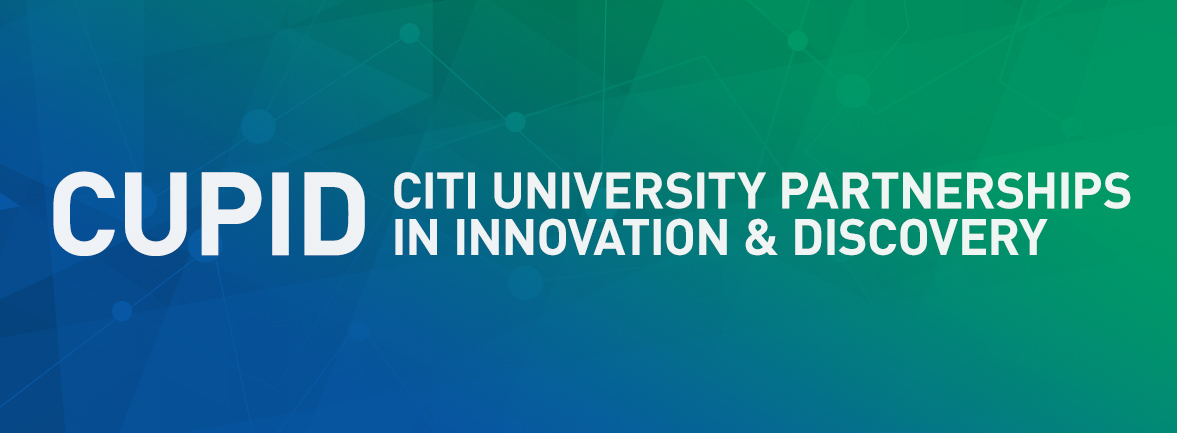Re-Imagining Citi’s Relationship with Higher Education in a Post-Pandemic World

Head of Strategy & Partnerships, Citi Ventures Studio

COVID-19 has affected all facets of our world, and higher education is no exception.
Since launching the Citi® University Partnerships in Innovation & Discovery (CUPID) program in 2017, we have engaged over 2,000 undergraduate and graduate students through strategic projects, case competitions, and other specialized programming.
When the pandemic halted interviews and canceled internships, students were left scrambling to find challenging and meaningful work opportunities over the summer break. With the support of Citi Chief Finance Officer Mark Mason, the CUPID Program Management team quickly organized a robust internship program for students to work remotely on challenging and innovative projects across Citi Ventures, Citi Productivity, and Citi Treasury. The 25 selected students gained real work experience, networked with Citi professionals, attended career preparation workshops, and heard directly from senior leadership across the firm.
To gain insights and inform our strategy, the CUPID team gathered feedback from program participants and university partners and reviewed the different paths that colleges and universities may follow in the coming years. We identified three major hurdles for higher education:
- Proving Value
A major factor that helps families justify the sizeable price tag of a college degree is the 24/7 immersive experience. Parents see value in the investment not only because of access to education, but also for the opportunities it provides their kids to meet new people, embrace their passions, and venture out on their own.
With the fall semester in full swing, colleges offering strictly remote learning must demonstrate their value like never before. Parents and students are questioning whether a remote learning environment affords students the same quality education and enrichment they originally signed up for. Studies show that the value of a college degree has traditionally had a significant monetary payoff, but we anticipate universities will need to leverage industry partners such as Citi to elevate the restrictive virtual environment through collaborative programming in addition to real-world work experience.
CUPID students say they feel great pressure to secure relevant work experience, active campus involvement, and an appropriate major so their resume can stand out. If they make it past the resume review, they must articulate why they want to pursue their chosen field before they have even completed all of their major prerequisites. Students are hungry for opportunities such as the CUPID Accelerate program that welcome candidates from all schools, majors, and interests. This affirmation has encouraged us to collaborate with our university partners and expand this program to maximize impact.
- Forcing Adaptation
Many universities around the world have made the difficult decision to adopt a partially or fully virtual learning model, which requires professors to adapt and be more agile and creative in delivering their curriculum via video conferencing platforms.
An associate professor we spoke to acknowledged that this hybrid or virtual approach to learning has been an experiment that no one expected to test, but one that universities have learned from and will change the long-term approach universities are following.
Multiple CUPID students expressed trepidation and skepticism about how the semester will unfold with these new models, but they also understand this has to be the "new normal" for now. Fortunately, they expressed gratitude for the ability to take part in relevant, hands-on programs. Professors have rapidly prototyped different instructional methods to produce educational outcomes comparable to those delivered before the pandemic. Citi wants to be part of the solution by giving students a strong sense of the universe of roles and functions available to them post-graduation.
- Exposing and Closing Disparities
It is important to acknowledge there is a large disparity between those who pursue higher education and those who do not. There are further disparities in the support that various institutions of higher education can offer.
An assistant professor we spoke to noted that the new virtual environment has not been overwhelmingly difficult for their students, but she is concerned about access and equity. Specifically, students who are in Individualized Educational Programs (IEPs) and others who require additional help may lack the support and coaching they would routinely have access to on campus.
Administrators must consider a host of hurdles that can adversely impact the quality of remote students' education because it's more important than ever the create an inclusive and accessible educational experience. Universities must develop an even closer relationship with their students, solicit feedback frequently on their experience, and make changes as necessary.
While there are significant gaps students need to address this school year, we aim to support them in attaining relevant work experience and opportunities to explore potential careers. The CUPID program has allowed students from different backgrounds and areas of study to apply what they learned in the classroom while they add value to various innovation initiatives across Citi.
Providing these kinds of experiences is all the more critical for students now, as they face an uncertain post-graduation job market. Whether the students we engage with want to work in financial services or not, we owe it to the future workforce to support and adapt alongside our partners in higher education.